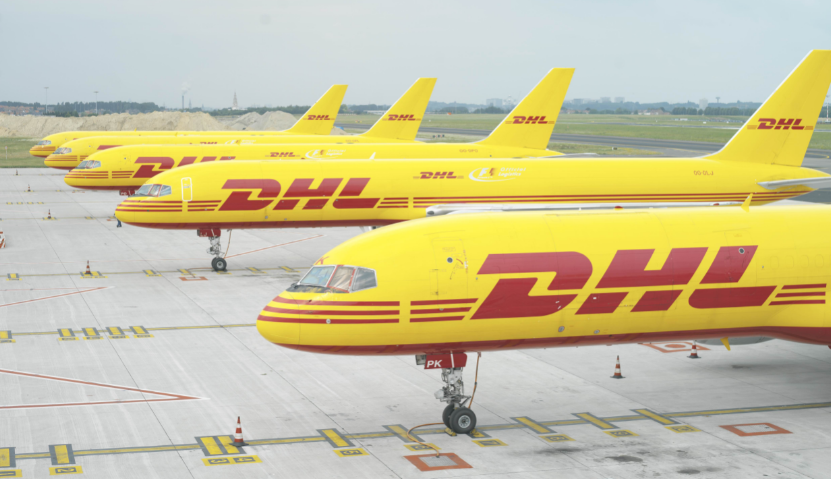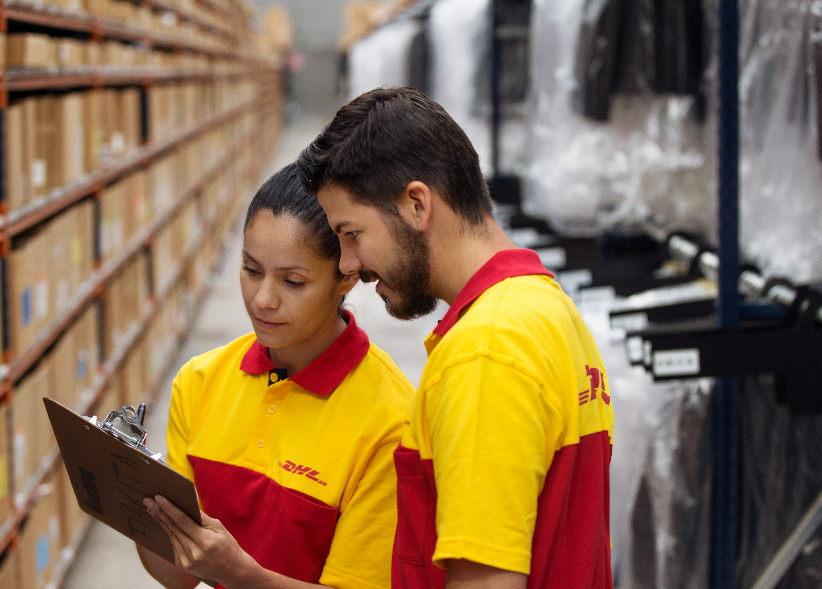Nour Suliman, CEO of DHL Express MENA, on how embracing E-Commerce has made DHL a star player both globally and in this region
2018 was an extremely good year for the company according to Nour Suliman, CEO of DHL Express MENA. “Two main factors contributed to the success of our business; the growth in our Time Definite International (TDI) shipments and most importantly, our increased focus on eCommerce which has been a star player for DHL both globally and in this region”.
DHL Express MENA generated 829.8 Million Euros in revenues in 2018, an impressive 7% jump from 2017 placing it as one of the best regions for DHL’s business. According to Suliman, this was mainly due to eCommerce sweeping over the Middle East market.

Online sales channels have powered the growth of some of today’s largest companies and it is estimated that the global eCommerce market will be worth $4 trillion by 2020, pushing eCommerce to become the largest retail channel in the world.
Suliman gives us the example of one of the biggest global online luxury retailers – MATCHESFASHION.COM. Thirty years ago, Tom and Ruth Chapman opened Matches, a small multi-brand boutique in the London suburbs. In 2006, after launching its online offering, the company saw its sales boost with orders flooding in from Asia, to the US and Europe.
With an increasingly young population, high disposable incomes and changing buyer habits, the MENA is now taking center stage as the world’s fastest growing eCommerce playground.
Traditional brick & mortar retail is being challenged by online shopping and this is forcing many established companies to reassess the way they do business. Even DHL has seen its business change from primarily a B2B player. “B2C has grown from around 10% of our global volumes in 2013 to more than 20% today, and our eCommerce activity in the MENA has seen an astounding 40% annual growth.”
There is no surprise that DHL has had to shift its focus, and look more closely on how to strengthen its eCommerce footing. “We have spent quite a bit to enhance our air network and expand our facilities to accommodate growth and the space needed for more shipment inflow. We upgraded our MENA airplanes to a uniform fleet of Boeing 767’s and added wide body operations into high-volume markets. We also increased rotations into key markets such as KSA and UAE which make up a major part of our business”. During this time DHL has doubled its DHL Aviation touch points and boosted its domestic and international flights to over 160 per week.
“The demands of eCommerce have forced us to shift mind-sets and re-align our processes in order to accommodate rising customer and retailer demands, as well as the ability and flexibility in our air and road network to adapt to volume spikes and swings”, says Suliman.
At the start of this year, DHL opened a new logistics facility in Dhahran, home to DHL’s Eastern Province Regional Office. “This is DHL’s fourth infrastructure investment in KSA in the past four years”, said Suliman. “We have invested heavily in KSA because it is a significant market for our business and because our clients have asked us to”.

Commenting on the company’s 2020 strategy and beyond, Suliman said that DHL will push ahead with its regional growth plans to support the shifting economic landscape and emerging trends. “eCommerce will definitely be a key driver for us and we are developing new competitive B2C products and services to grow our market share and leverage on the fast-paced trends for cross-border shipments. We see an opportunity to increase activity between Asia, the Middle East and Africa and we will continue to add capacity and expand our reach across key markets to enhance transit times, and deliver greater capability. We will also continue to look at how best to leverage on our facility investments in Saudi Arabia, Egypt and the UAE, be it by adding more flight frequencies or by re-designing our routings to support the eCommerce and broader logistical demands of our MENA clients.”
According to Suliman, there is more in store for DHL in the near future with new facility upgrades planned in Oman, Dammam, Abu Dhabi, DWC, and Qatar, as well as upgrades to its air/road networks, increased flights and investments in new technologies.
Suliman explains that DHL is committed to helping eCommerce players stay competitive. “Our logistics expertise is crucial in supporting eCommerce; innovation and customer service is where we excel. We add value by helping online merchants reach even more of the B2C market with speed, flexibility and at reduced costs.”
eCommerce is being shaped by technology, especially in last mile delivery. Most of the challenges come on this last leg, and according to Suliman, DHL is always trying out new solutions to deliver faster, conveniently and at a lower cost. “In Europe and the US we have seen autonomous vehicles, drones, and delivery bots amongst other last mile delivery methods, while in the UAE we launched the ‘cubi-bike’, vespas and our On Demand Delivery service.”
There is also much innovation in the visibility and traceability of shipments, and Suliman explains that mobile technology and the expectation of real time information in the palm of your hand 24/7 will continue to increase.
One of the booming eCommerce businesses in the region is retail, more specifically ‘fashion’, and DHL already has many established designers in its portfolio and hands-on expertise in steering them through their success journeys. “We are now focused on how to help boost the new designers, the emerging talent and start-ups, who are keen to tap into cross-border markets, and who we consider a key economic stimulant.”
DHL has tailored all-inclusive solutions for small designers that extend to efficient transportation services, customs support and access to a strong customer base, enabling them to compete internationally.
“We have many success stories close to home – look at UAE’s The Modist, which was launched in 2017 and today ships to over 120 countries. That is a remarkable achievement which was made possible by fusing a great idea with business talent and expert logistics support”.
Discussing how DHL plans to tackle risks arising from online retail platforms investing in their own in-house logistics capabilities, including transport and warehousing, Suliman explains that the company has taken a proactive approach and is investing in dedicated warehousing facilities that meet the needs of e-tailers, citing its new dedicated eCommerce warehouse in Dubai’s EZone. “Warehousing technology is complex and requires substantial investment, as well as sophisticated management systems which not all eCommerce players can afford or are proficient in. We have been in the business of logistics for over 50 years and are well equipped to manage such facilities which enable eCommerce players to maintain a distribution center in the UAE and connect their products to the GCC market and globally.”

Last year DHL rolled out its global campaign – ‘Where Everything Clicks’ – a brilliant eCommerce resource to help web merchants increase sales through advanced market intelligence, giving them necessary data to help them better reach their customer base internationally.
According to a study by DHL and the Cranfield School of Management, eCommerce has begun to spark cross-border trade in the B2B sector. Suliman states that more and more of DHL’s B2B customers are starting to increase their online presence to reach a wider market.
“We are seeing some of our heavyweight business staples in manufacturing and automotive for example, bypass the middleman and engage directly with suppliers and customers via digital platforms.” B2B companies are trying to mimic the B2C model to reap the benefits by adapting their supply chains to provide a more flexible, agile, scalable, quicker and mobile customer experience.
“And this is where things can get a bit challenging”, says Suliman. “Customers expect a seamless experience from these industries which is not always feasible seeing their distinct differences in scale and modus operandi. Hence the need for effective logistics seeing how a significant aspect of online commerce is to be able to efficiently manage the physical movement of goods from their origin to the customer at a promised time”.
B2B companies have to provide multiple transport and delivery options to increase their competitiveness.
“We help them navigate this new terrain by providing direct access to overseas markets through our global network; we help them build operational flexibility without the need for extensive warehousing and distribution networks. We help them streamline their logistics processes and minimize financial risks”.
These are just a few of the premium service offerings DHL provides. That and the indirect benefits of brand credibility and trust – a company like DHL offers a stamp of assurance that goods will be delivered on time every time.
As Suliman states, DHL is seizing the eCommerce opportunities which are taking the industry by storm, and has set its sights firmly on becoming the global logistics partner of choice for this business segment.




